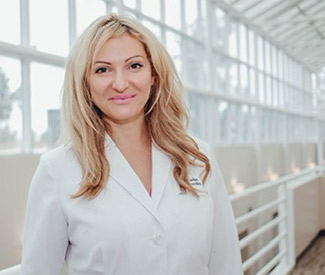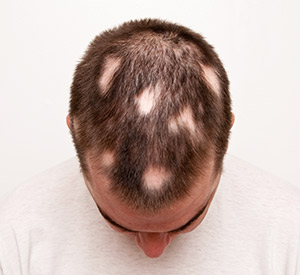New drug reverses hair loss from alopecia

Alopecia areata, a little-known autoimmune disorder, took center stage at this year’s Academy Awards when actor Will Smith slapped comedian Chris Rock for joking about his wife’s bald head. Jada Pinkett Smith has spoken about her hair loss struggles due to the disease, which causes the immune system to attack and destroy hair follicles on the scalp and other parts of the body.
Pinkett Smith, who shaved her head in 2021 because of it, is not alone. As many as 6.8 million people are affected by the debilitating condition, according to the National Alopecia Foundation. Now a new drug can help many of them restore some or all of their hair, says UCI Health dermatologist Natasha Mesinkovska, MD, PhD, an alopecia expert and principal investigator at UCI Health of a clinical trial for the medication.
Baricitinib oral tablets — developed by Eli Lilly and approved by the U.S. Food and Drug Administration (FDA) earlier this year — is the first systemic treatment for alopecia areata.
Clinical trials show it is most effective on patients with moderate to severe alopecia areata who have lost 30% or more of the hair on their head, but it also may benefit others, including people with eyebrow and eyelash loss.
“We were one of numerous sites across the U.S. and the world to participate in studies of baricitinib,” says Mesinkovska, who served as chief scientific officer for the National Alopecia Areata Foundation and was instrumental in advocating for the drug’s development and approval.
“For the last decade, I was trying to connect everyone,” she says, knowing how much her patients were suffering with the disorder. “I was trying to make the companies talk to the doctors, and asking the doctors to talk to the scientists, and pushing for the voices of patients to be heard.”
How it works
The drug, a type of janus kinase (JAK) inhibitor, works by blocking the activity of certain enzymes and pathways that can cause inflammation and lead to follicle damage.
“Basically, it calms the autoimmune response that is destroying the follicle and making the hair fall out,” Mesinkovska says.
Similar medications have been approved over the last decade to treat rheumatoid arthritis and other autoimmune conditions, she notes. “In a way, these inhibitors are not brand new and their safety has been established.”
Best of all, unlike existing medications that are usually administered by injection, the new drug comes in pill form, making it easier to take. It also doesn’t require refrigeration or other special handling, she says.
Mesinkovska says the medication is already widely available and any dermatologist can prescribe it to their alopecia areata patients.
What is alopecia areata?
While anyone can develop alopecia areata, most people get it in their teens, 20s or 30s, according to the National Institutes of Health.
“We don’t know the cause,” Mesinkovska explains. “We think it’s like a perfect storm, in which there’s some sort of insult to the body and, like other autoimmune diseases, something just takes over.”
Inherited genes appear to play a role.
“People who develop alopecia areata have a 20% chance of having another family member with the disease,” she says. “Often, they also have family members with other autoimmune disorders such as arthritis and psoriasis.”
The condition also varies in severity. “For some people, their hair will start falling out in chunks,” she says. “Others may have just a little, round patches of hair loss.”
About 10% of alopecia patients lose all their hair, not just on their scalp. This can trigger a host of additional health repercussions.
“People can lose their eyebrows, eyelashes, nose hair and even the hair inside their ears,” says Mesinkovska.
Without the protection of lashes and eyebrows, patients will struggle with sweat getting into their eyes. The effects of hair loss in nasal and auditory passages may be even more severe, she adds.
“Losing nose hairs can make people more vulnerable to upper respiratory infections. And because hairs in the ear play a role in collecting, relaying and amplifying sound, alopecia areata also can affect your hearing.”
A major psychosocial toll
Alopecia also can have devastating effects on young adults at a time when many are entering adulthood, getting married or at a crucial phase in their career arc.
“Having to suddenly deal with a drastic change in their appearance has a huge psychosocial impact,” Mesinkovska explains.
“When they starting losing hair, people say it feels as if they’re losing themselves. Patients really struggle with that loss of identity.”
Alopecia areata can even cost a person his or her career, she says. “Some of my patients are actors and they’ve lost work because of their hair loss."
Remarkable transformations
That's why Mesinkovska is thrilled about the drug’s potential to reverse the disease in some patients.
About 30% of patients who take the drug will regrow 80% or more of their hair within about 36 weeks, while others may experience lesser degrees of hair regrowth.
She was startled by the effectiveness of baricitinib on patients in the clinical trial. “I’d see patients every month or two and there were times when their hair had grown so much that I didn’t recognize them.”
Mesinkovska continues to be a patient advocate and relays information about the drug at professional conferences, in webinars, to get the word out.
“This treatment provides such a transformation,” she says. “You see these kids light up as their hair comes back. Adults will smile more and make more eye contact. It’s not just their hair, their whole personality changes. That’s something to get excited about.”
Related stories
Explore further
Browse more blog posts by topic.






